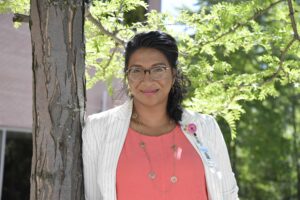 Abby Sirisegaram-Cole, a graduate of the Michener Institute’s Radiation Therapy program and 2011 valedictorian, stands as a testament to the versatility and compassion of today’s healthcare professionals.
Abby Sirisegaram-Cole, a graduate of the Michener Institute’s Radiation Therapy program and 2011 valedictorian, stands as a testament to the versatility and compassion of today’s healthcare professionals.
As a Radiation Therapist, Abby employs ionizing radiation – a high-powered x-ray beam – to eradicate cancer cells within the human body. Often involving tasks such as acquiring radiation planning scans, designing radiation plans, and evaluating radiation doses, her overarching goal is to maximize the impact on cancer cells while minimizing harm to healthy tissues. This feat is only achieved through a delicate balance of both technical precision and unwavering empathy.
“In a field where technology evolves rapidly and techniques undergo frequent transformations, adaptability is paramount,” says Abby. “You cannot be stagnant, and you must continuously push boundaries, consider innovative approaches, and incorporate advancements like AI to enhance efficiency. At the same time, our key focus is to always maintain the highest standards of care for our patients.”
Abby’s diligence in the field is evident as she has navigated various roles, including her most recent position as an Interim Clinical Specialist Radiation Therapist (CSRT) at the Royal Victoria Regional Health Centre (RVH) in Barrie, Ontario. In this capacity, she played a crucial role in the patient journey when they present urgently with advanced cancers that require expedited triaging and care.
At the same time, she utilized a large range of radiation techniques, from stereotactic radiation to palliative care, further showcasing the adaptability required in a constantly evolving healthcare landscape.
These are not solely complex technical tasks; they also require a deep understanding of her patient’s emotional, psychological state, and well-being, particularly during challenging times like the COVID-19 pandemic.
“We know more recently from the pandemic; many patients are coming into hospitals with a much higher disease burden. There is a bigger onus of physical care, but also a larger empathetic and psycho-social load,” says Abby. “For two and a half years, patients received care without the physical support of their family or friends being able to accompany them to appointments within the hospital setting. In many cases, they were finding out they had cancer, and their families were on the phone. If it was my mom or sister, how would I want healthcare professionals to care for them?”
Continuously emphasizing the importance of emotional support, especially for vulnerable patients, Abby remains steadfast on the necessity of tailored care. In a heartfelt poem titled “Treat You Like My Own,” she creatively explores her lived experience of her emotional and professional dissonance during her mother’s cancer journey in the midst of the pandemic.
And to further her commitment to championing the importance of experience, for both patients and healthcare professionals, Abby is proud to have recently participated in the “I Belong Here” campaign at RVH (YouTube, Online Campaign). Here, she spoke to her individual story of belonging in the healthcare settings and about microaggressions, covert forms of racism in the workplace, and the importance of education around Diversity, Equity, Inclusion and Belonging (DEIB).
As she embarks on new pursuits—with her next journey being a Masters in Organizational Leadership at Johns Hopkins—Abby remains hopeful about the future in healthcare while looking fondly at the past.
In reflecting on her journey, Abby recognizes the Michener Institute’s foresight in emphasizing interprofessional collaboration, staying current with technology, and fostering a culture of continuous learning. These efforts equipped her to adapt to her field’s dynamic nature and provided her with the tools to elevate patient advocacy to an organizational and systems level.
“The supportive staff at Michener created a space where asking questions was not just welcomed but crucial for bridging the gap between textbook knowledge and practical application,” says Abby. “And now, I am incredibly privileged to do what I do every day. When patients undergo radiation, there is a lot of trust involved, and it can be incredibly scary for them. For me, it is important to remain grateful for that trust and my continued ability to provide high quality cancer care close to home.”